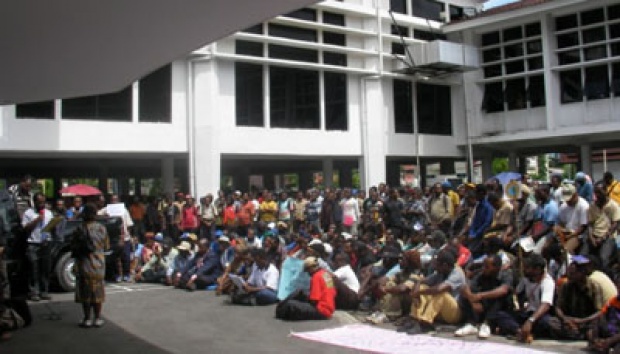Papua's Kingmi Church Chair: Do We Have to Change Our Skin Color?
Translator
Editor
27 June 2020 14:07 WIB

TEMPO.CO, Jakarta - Chairman of the Synod of Indonesia Gospel Tabernacle Church (Kingmi) in Papua, Rev. Benny Giay regretted the conviction of seven Papuan political prisoners who were tried for treason.
He said the accused were the victims of smoke screen allegations made up to divert the public attention away from the racism incident at the Papuan student dormitory in Surabaya, East Java, August last year. "If the police had moved faster and arrested those who hurled racial slurs in the first place, these seven young Papuans probably wouldn't have been charged with treason," Benny, 65, said during the special interview with Tempo last Thursday, June 18.
On June 17, the Balikpapan District Court's panel of judges declared the seven men guilty and sent them to 10 to 11 months behind bars. Although the sentences are lighter than the five to 17 years sought by the prosecution, the men were still imprisoned for only participating in peaceful anti-racism protests. "The separatism allegation was deliberately made to divert the attention from the racism issue," Benny added.
Benny who served as an expert witness in the trial said that the treason charge was the excess of discrimination, one of the four issues that can be traced to the roots of the conflicts in Papua. "The state must first settle these issues. If Papuans are still obstinate after that, then it's okay to charge them with treason," said the church elder who for decades has fought for the rights of indigenous Papuans.
From his residence in Sentani, Jayapura, Benny spoke to Tempo's Mahardika Satria Hadi via telephone on Tuesday and Thursday, June 16 and 18. The theologian who specialized in social anthropology talked about the history of racism in the land of Papua, the stalled dialog with Jakarta, to his disappointment in President Joko Widodo.
What exactly is the root of racism in Papua?
It has already been spelled out by the Indonesian Institute of Sciences in its book titled Papua Road Map published in 2009. There are four fundamental issues that caused the conflicts in Papua. One of them is discrimination which has been existent throughout the history of Papua ever since the integration began. Propaganda during the period 1961-1962 even said that the Indonesian government came to Papua to elevate the people of Papua to be equal to other ethnic groups of Indonesia. That already is a condescending statement and it reeks of racism. This discrimination that marginalizes the Papuans comes from the state, you see.
What are other factors besides discrimination?
Second, the Indonesian government's failure to develop the economy, health care, and education in Papua. Third, the differing views between Papua and Indonesia regarding the history of Papua's integration. Papuans think that Indonesia came to occupy the Papua land because we are a different country whereas the Indonesian government believes that Papua is its territory. These opposing views on political status will never end. As a result, Papuans continue to fight. Fourth, the military oppression continues even to this day and human rights violations are never dealt with.
What should the central government do to end the conflicts in Papua?
Take care of those four problems mentioned above first. Now we have a difference of opinions. There's a clash of two different cultures like what the Indonesian and the Dutch people had in the past. As long as the state cannot resolve these issues, Papuans will continue to create troubles and end up in jail. This is a vicious cycle. Papuans understand that Papua and Aceh are the same, but they also see starkly different attitudes of the central government (towards the two provinces).
What kind of different treatments did the government give to Aceh dan Papua?
Aceh and Papua are the most resource-rich provinces, but most of the earnings are sent back to Jakarta. Both Aceh and Papua had independence movements: GAM (Free Aceh Movement) and OPM (Free Papua Movement), but the two issues were handled differently. Indonesia managed to dialog and negotiate with Aceh. After negotiations, GAM was no longer considered a separatist group so military oppression wasn't necessary. Papuans now have ULMWP (United Liberation Movement for West Papua). Papuans also want to dialog and negotiate.
What is the problem?
We ask the same question. Do we have to change the color of our skin and hair? Or do we have to change our religion? In Aceh, the GAM flag was allowed to fly. In Papua, if we fly the Morning Star flag, we can be shot or jailed.
Read the full interview in Tempo English Magazine























